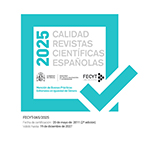El delegado y los cónsules: diplomacia y equilibrio (José Martí en el Oriente cubano, abril-mayo de 1895)
Abstract
In this paper is exposed how José Martí behaved concerning foreign interest (USA, Great Britain, France, Germany) when he disembarked in Cuba at the right beginning of the uprising. Martí explained that the revolution aspired to complete national sovereignty but respected foreigners’ live and ownership. He declared the country open to free world trade, which implies the end of the Spanish monopoly and the impossibility for another one (United States, obviously). Tactically, he neutralized the enemy propaganda. Strategically, he tried to build an equilibrium between foreign states in that region, as a future guarantee for independence, peace and prosperity for the free West Indies, this world crossroads.Downloads
Article download
License
In order to support the global exchange of knowledge, the journal Revista Complutense de Historia de América is allowing unrestricted access to its content as from its publication in this electronic edition, and as such it is an open-access journal. The originals published in this journal are the property of the Complutense University of Madrid and any reproduction thereof in full or in part must cite the source. All content is distributed under a Creative Commons Attribution 4.0 use and distribution licence (CC BY 4.0). This circumstance must be expressly stated in these terms where necessary. You can view the summary and the complete legal text of the licence.











